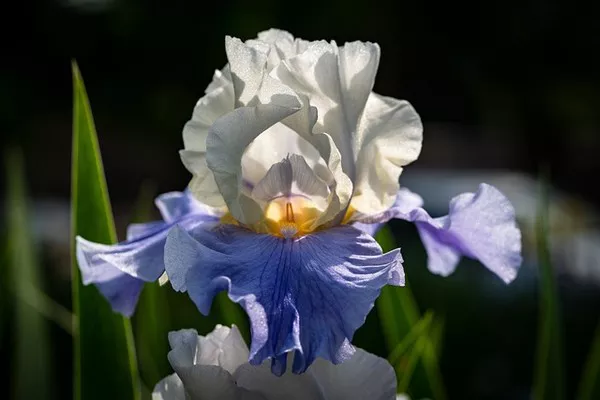Iris flowers, with their delicate petals and vibrant hues, have captivated humanity for centuries. Belonging to the genus Iris, these flowers are renowned for their beauty and diverse symbolism across various cultures. In this essay, we delve into the multifaceted world of iris flowers, exploring their types, symbolism, and the art of caring for these exquisite blooms.
Types of Iris Flowers
The iris genus encompasses a wide array of species, each distinguished by unique characteristics. Among the most prominent types are:
Bearded Iris (Iris germanica): Recognizable by their fuzzy “beards” on the lower petals, bearded irises are prized for their striking colors and patterns. They are commonly found in gardens and are known for their resilience and ease of cultivation.
Siberian Iris (Iris sibirica): Native to Europe and Asia, Siberian irises are known for their graceful appearance and slender foliage. They typically bloom in shades of blue, purple, and white, adding elegance to any garden landscape.
Japanese Iris (Iris ensata): Characterized by their large, showy flowers, Japanese irises are revered for their cultural significance in Japan. They often feature intricate patterns and are associated with themes of purity and spirituality.
Dutch Iris (Iris hollandica): With their distinctive upright petals, Dutch irises are popular for both garden cultivation and floral arrangements. They come in a wide range of colors, including blue, purple, yellow, and white, making them versatile choices for floral design.
Louisiana Iris (Iris hexagona): Native to the southeastern United States, Louisiana irises thrive in wetland habitats and are valued for their vibrant blooms and adaptability to water gardens.
Pacific Coast Iris (Iris douglasiana): Found along the western coast of North America, Pacific Coast irises are prized for their hardiness and natural beauty. They come in a variety of colors and are well-suited to coastal climates.
Iris Flower Symbolism
The symbolism of iris flowers is rich and varied, encompassing themes of faith, wisdom, and hope across different cultures and contexts. Some of the key symbolic associations include:
Faith and Wisdom: In Greek mythology, Iris was the messenger of the gods, traversing the heavens with her rainbow-colored wings. As such, iris flowers have long been associated with messages from the divine and are often seen as symbols of faith and wisdom.
Hope and Renewal: The iris’s ability to thrive in various environments and climates has led to its symbolic association with hope and renewal. Its resilience in the face of adversity serves as a reminder of the transformative power of perseverance and resilience.
Royalty and Nobility: Throughout history, iris flowers have been favored by royalty and nobility for their regal beauty and elegance. In ancient Egypt, iris blooms were used in funerary rites to symbolize the journey of the soul to the afterlife, while in medieval Europe, they adorned the coats of arms of noble families as a symbol of prestige and honor.
Femininity and Beauty: With their delicate petals and graceful appearance, iris flowers are often associated with femininity and beauty. In art and literature, irises have been depicted as symbols of feminine allure and grace, evoking themes of romance and sensuality.
Protection and Healing: In some cultures, iris flowers are believed to possess protective properties and are used in rituals to ward off evil spirits and negative energy. Additionally, irises have been used in traditional medicine for their purported healing properties, particularly in treating skin ailments and respiratory conditions.
Caring for Iris Flowers
To ensure the health and vitality of iris flowers, proper care and maintenance are essential. Here are some tips for cultivating thriving iris plants:
Sunlight and Soil: Irises thrive in well-drained soil and require plenty of sunlight to bloom. Plant them in a location with full sun exposure, ensuring that the soil is loose and well-drained to prevent waterlogging.
Watering and Fertilizing: While irises are relatively drought-tolerant, they benefit from regular watering during the growing season, especially during dry spells. Avoid overwatering, as this can lead to root rot. Additionally, fertilize iris plants with a balanced fertilizer in the spring to promote healthy growth and vibrant blooms.
Dividing and Transplanting: Over time, iris plants can become overcrowded, leading to reduced blooming and vigor. To rejuvenate overcrowded clumps, divide iris rhizomes every three to four years, replanting them in fresh soil enriched with compost.
Pest and Disease Management: Keep an eye out for common pests such as iris borers and aphids, which can damage iris plants if left unchecked. To prevent infestations, inspect plants regularly and treat any pest issues promptly with organic or chemical remedies. Additionally, practice good garden hygiene by removing dead or diseased foliage to prevent the spread of disease.
Winter Protection: In regions with harsh winters, provide protection for iris plants by mulching around the base to insulate the roots from freezing temperatures. This will help prevent frost damage and ensure the survival of the plants during the colder months.
Conclusion
In conclusion, iris flowers are not merely ornamental blooms but powerful symbols imbued with cultural significance and timeless beauty. From their diverse varieties to their profound symbolism, irises continue to inspire and enchant people around the world. By understanding and appreciating the symbolism of iris flowers, we can cultivate a deeper connection to nature and the rich tapestry of human experience. Moreover, by mastering the art of caring for these exquisite blooms, we can ensure that their beauty endures for generations to come, serving as a reminder of the resilience and vitality of the natural world.


